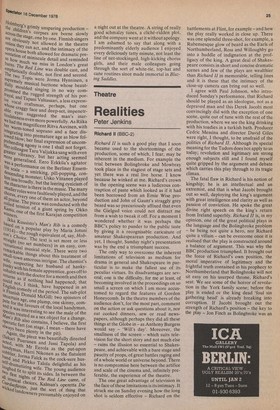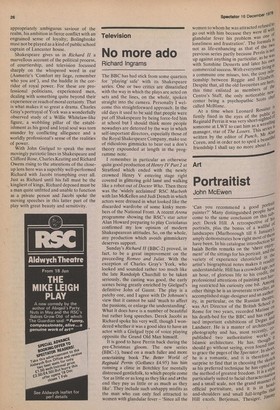Theatre
Realities
Peter Jenkins
Richard ii (BBC-2) Richard II is such a good play that I soon became used to the shortcomings of the production, some of which, I fear, may be inherent in the medium. For example the trial between Bolingbroke and Mowbray took place in the stagiest of stage sets and yet there was a real live horse. I know because he winked at me. Richard's crown in the opening scene was a ludicrous contraption of paste which looked as if it had been borrowed from an Ernie Wise production and John of Gaunt's straggly grey beard was so precariously affixed that even the Gielgud voice could not distract me from a wish to tweak it off. For a moment I wondered whether it was perhaps the BBC's policy to pander to the public taste by giving it a recognisable caricature of amateur Shakespearean production. And yet, I thought, Sunday night's presentation was by the end a triumphant success.
The only way to overcome the inherent limitations of television as medium for drama in general and Shakespeare in particular is to make the fullest use of its peculiar virtues. Its disadvantages are several; one is the difficulty, for me at least, of becoming involved in the proceedings on so small a screen on which I am more accustomed to regard the features of Gordon Honeycomb. In the theatre members of the audience don't, for the most part, comment on the action or ask questions about it, nor eat cooked dinners, sew or read newspapers, although perhaps they did all these things at the Globe in as Anthony Burgess would say 'Will's day'. Moreover, the smallness of the screen which suits television for the short story and not much else ruins the illusion so essential to Shakespeare, and achievable with a bare stage and paucity of props, of great battles raging and of a whole world or universe beyond. There is no compromise here between the artifice and scale of the cinema and, infinitely preferable, the experience of the theatre.
The one great advantage of television in the face of these limitations is its intimacy. It struck me on Sunday evening how the long shot is seldom effective Richard on the battlements at Flint, for example and how the play really worked in close up. There was one splendid three-shot, for example, a Rubensesque glow of beard as the Earls of Northumberland, Ross and Willoughby go into a huddle of indignation at the profligacy of the king. A great deal of Shakespeare consists in short and concise dramatic scenes and few of the plays are wealthier than Richard II in memorable, telling lines and it is these that the intimacy of the close-up camera can bring out so well.
I agree with Paul Johnson, who introduced Sunday's performance, that Richard should be played as an ideologue, not as a depraved man and this Derek Jacobi most convincingly did with the exception of one scene, quite out of tune with the rest of the production, where we see the king drinking with his toadies in a turkish bath. Producer Cedric Messina and director David Giles were right, I thought, to be unafraid of the politics of Richard II. Although its special meaning for the Tudors does not apply to us today; revolution and legitimacy are strong enough subjects still and I found myself quite gripped by the argument and debate which carries this play through to its tragic climax.
The fatal flaw in Richard is his notion of kingship; he is an intellectual and an extremist, and that is what Jacobi brought out so well, deploying the king's argument with great intelligence and clarity as well as passion of conviction. He spoke the great divine right speech on the king's return from Ireland superbly. Richard II is, in my opinion, one of the great political plays in the language and the Bolingbroke problem he being not quite a hero, nor Richard quite a villain can be overcome once it is realised that the play is constructed around a balance of argument. This was why the BBC production triumphed. It brought out the force of Richard's own position, the moral imperative of legitimacy and the frightful truth contained in his prophecy to Northumberland that Bolingbroke will not sit easy on his usurped throne, Richard's seat. We see some of the horror of revolution in the York family scene; before the play is ended or the king dead 'foul sin gathering head' is already breaking into corruption. If Jacobi brought out the strength of Richard's position the key to the play Jon Finch as Bolingbroke was an appropriately ambiguous saviour of the realm, his ambition in fierce conflict with an engrained sense of loyalty; Bolingbroke must not be played as a kind of public school captain of Lancaster house.
Shakespeare gives us in Richard II a marvellous account of the political process, of courtiership, and television focussed sharply on the whispered word in ear (Aumerle's 'Comfort my liege, remember who you are'), and the huddle in the corridor of royal power. For these are professional politicians, experienced men, dealing with something quite beyond their experience or reach of moral certainty. That is what makes it so great a drama. Charles Gray's portrayal of York was a wonderfully observed study of a Willie Whitelaw-like figure, a wobbling pillar of the establishment as his good and loyal soul was torn asunder by conflicting alliegance and a worldly professional's sense of the realities of power.
With John Gieigud to speak the most movingly patriotic lines in Shakespeare and Clifford Rose, Charles Keating and Richard Owens rising to the attentions of the closeup lens here was a superbly well-performed Richard with Jacobi triumphing over all. Just as Richard until his all must be the kingliest of kings, Richard deposed must be a man quite unfitted and unable to function as a private person and Jacobi spoke the moving speeches in this latter part of the play with great beauty and sensitivity.



































 Previous page
Previous page